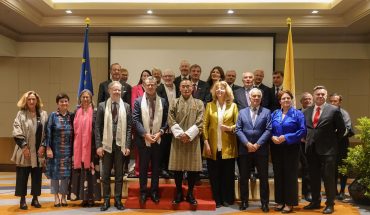
TENZIN LHAKI | Thimphu
In response to the increasing prevalence of pyramid schemes in Bhutan, key government agencies have joined forces under a newly adopted Standard Operating Procedure (SOP) to strengthen detection, prevention, and enforcement.
The coordinated effort will be led by the Competition and Consumer Affairs Authority (CCAA), with support from the Royal Monetary Authority (RMA), Department of Law and Order (DLO), Department of Revenue and Customs (DRC), Department of Trade (DoT), and Department of Industry (DoI).
According to the CCAA, the SOP provides a structured framework to identify, investigate, and take action against pyramid schemes and related fraudulent financial models.
Further, it aims to ensure consumer protection, safeguard financial stability, and uphold market integrity.
“Early detection of pyramid schemes is inherently difficult because these operations are deliberately discreet. They spread primarily through close social networks of friends, relatives, and colleagues, making them hard to trace or report,” a CCAA official said.
The SOP applies to all processes and activities relating to the detection, investigation, prevention, enforcement, and monitoring of pyramid schemes within Bhutan.
It defines a pyramid scheme as any model in which participants earn financial gains primarily from recruiting new members rather than selling legitimate products or services.
Under the framework: CCAA will coordinate detection, investigation, enforcement, consumer redressal, and public awareness, RMA will monitor financial transactions, freeze suspicious accounts, and prevent unauthorized fund transfers.
In addition, DLO will assist with public awareness campaigns and compliance cessation, DRC will investigate tax compliance and potential evasion by scheme promoters, DoT and DoI will review business registrations and licensing to flag suspicious enterprises.
Agency involvement will depend on the nature, scale, and impact of each case.
The SOP outlines a three-phase framework beginning with detection. Authorities will receive complaints, tips, or intelligence from the public, media, and stakeholders, alongside proactive monitoring such as; Surveillance of promotional activities, Online and social media scanning and monitoring of cross-border remittances for unusual patterns.
Investigations will be led by the CCAA with inter-agency support, gathering evidence such as contracts, promotional materials, advertisements, testimonies, and financial records.
During investigations, RMA will trace financial flows and freeze account, The DRC will review tax records, DoT and DoI will verify licensing legitimacy, The DLO will provide intelligence on promoters.
Once confirmed, the CCAA will issue formal bans and cease orders, publish advisories, and facilitate consumer grievance redressal. Other agencies will revoke licenses, recover taxes, and block unauthorized transfers as appropriate.
The enforcement of pyramid scheme cases will fall under the Consumer Protection Act of Bhutan 2012 and relevant trade and tax laws. The CCAA will serve as the nodal authority for coordination and monitoring, with periodic reviews of the SOP to adapt to emerging risks and legal changes.
News of the SOP has drawn varied reactions from the public. Many citizens welcomed the coordinated approach but emphasized the need for stronger grassroots awareness.
The CCAA acknowledged that enforcement is complicated by the discreet nature of pyramid operations. Many schemes in Bhutan originate outside the country but quickly gain local traction.
Promoters typically lure participants with promises of unusually high and rapid returns in exchange for recruiting others.
Despite repeated advisories, individuals often fail to verify legitimacy before joining. According to the CCAA, participants are sometimes reluctant to disclose details about their involvement, which hinders investigations.
“Most schemes encountered in Bhutan have originated outside the country but quickly gain traction locally. Promoters typically lure participants with the promise of unusually high, rapid returns,” the official explained.
Others called for stricter penalties to deter promoters. Pema Dorji, a corporate employee, said, “Freezing accounts and revoking licenses is important, but those who knowingly deceive people should also face stronger criminal charges. Otherwise, they will just find new ways to operate.”
The CCAA further noted that securing redress for victims is complex. Many who later claim to be victims had actively participated and only sought compensation after the scheme collapsed.
Some citizens expressed skepticism about enforcement, noting that past schemes continued for months before action was taken.
Karma Wangdi, a civil servant, said, “The agencies often act after the damage is already done. The SOP sounds strong on paper, but its real test will be whether they can intervene early.”
“When complainants can clearly demonstrate that they joined solely as investors without knowing the real scheme modality and did not recruit or promote to others, the CCAA actively facilitates consumer redress,” it stated.
“I think this is a timely initiative because too many people have already lost money to these scams,” said Sonam Choden, a shopkeeper in Thimphu. “The awareness programs should go deeper into rural areas where people may not have access to information online.”
Authorities have emphasized the importance of public awareness as a primary safeguard against fraudulent schemes. The CCAA conducts national advocacy programs on pyramid schemes and online fraud, reaching more than 4,000 consumers annually.
Meanwhile, younger Bhutanese highlighted the role of education in prevention.
Tashi Lhamo, a college student, said their generation is targeted online with quick-money offers. “I think schools and colleges should include sessions on financial literacy so students can recognize pyramid schemes before they fall into them.”
Animated educational videos highlighting the risks and warning signs are broadcast on BBS and Samuh, and are also available on the CCAA website and social media.
The Authority urges the public to remain vigilant, avoid schemes promising quick returns through recruitment, and report suspicious activities through official channels.
“Because such schemes can thrive only when new participants keep joining, our priority is to help consumer’s spot red flags early and make informed financial decisions,” the official noted.
The agencies also reiterated its call for citizens to play a proactive role in combating fraud.
“By refusing to participate and discouraging others, individuals can help protect their communities and safeguard Bhutan’s economic integrity,” it said.





